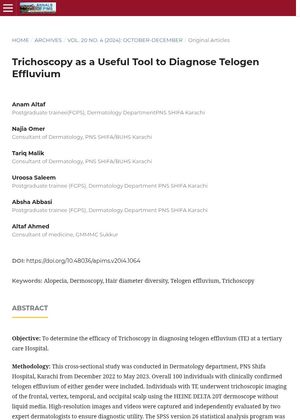Trichoscopy as a Useful Tool to Diagnose Telogen Effluvium
November 2024
in “
Annals of PIMS-Shaheed Zulfiqar Ali Bhutto Medical University
”

TLDR Trichoscopy is an effective, non-invasive way to diagnose telogen effluvium.
Trichoscopy has been demonstrated to be an effective, non-invasive diagnostic tool for identifying telogen effluvium (TE) in a study conducted at PNS Shifa Hospital, Karachi. The study involved 100 individuals with clinically confirmed TE, with a mean age of 32.7 years. Trichoscopic imaging revealed that perifollicular scaling was the most frequent finding (95%), followed by hair diameter diversity (48%) and vellus hair (42%). Significant differences in trichoscopic findings were observed between the frontal and occipital scalp regions, aiding in differentiating TE from androgenetic alopecia. This method allows for early and accurate diagnosis, reducing the need for invasive procedures.






